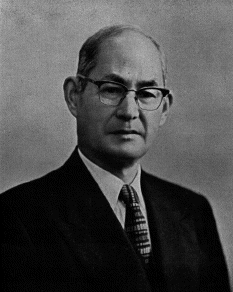by Moriyuki Abukuma, July 2002

(1893-1961)
Tadao Yanaihara was born in January 1893 as a son of a physician at
a
village of Sikoku Island. At the age of 18, he joined Uchimura's Sunday
Biblical Lecture when he studied Law and Economics at the Imperial
University of Tokyo. 3 months later, Rutsuko, Uchimura's daughter,
died
in 1912. At her funeral, Uchimura's cry "Hallelujah
Rutsuko!" struck Yanaihara's mind like by a sudden lightning. Yanaihara
came to realized that "believing Christianity was a matter of life
and death."
In 1920 he became Professor of colonial policy at the Imperial University.
He succeeded to the Christian mission of Uchimura as one of his Seven
Apostles when Uchimura died in 1930.
When Japan wagged war against China in summer 1937, an heavenly voice
caught him to take an action. "As if using the pen of bone and the
ink
of blood and sweat," Yanaihara wrote an article, "Ideal of the Nation,"
to a best-selling magazine in Japan. But his article of Christian
pacifism was deleted and the magazine was prohibited to selling. In
following October, Yanaihara opened a lecture of Christianity, titling
"the Nation of God." At the end of the lecture, he said:
"Today is the day of the funeral of our beloved Japan, who lost her
ideal in this world of hypocrisy. I have to be angry but can't; I have
to cry but I can't. Ladies and gentlemen! Do you understand what I
want
to say? If you can, let us bury this nation first, in order to revive
the ideal of Japan."
This saying caused him to resign the chair at the University under the
pressure of the military government. But he did not cease his battle
against the militarism.
At the age of 45, Yanaihara became "the voice of one crying in the
wilderness" (Mt. 3:3), publishing his Christian magazine "Kashin" (or
"Joyful News") and "sealing the testimony among his disciples" (Is.
8:16). The Japanese government often deleted and banned the Kashin,
and
finally ordered to abolish it in December 1944. Yanaihara never stopped
the battle of truth. He then published another Newsletter,
"Kashin-Kaiho" (or "Letter of Joyful News"), by hand printing and by
supporter's contributions of paper till Japan unconditionally
surrendered in August 1945.
Tadao Yanaihara is "the conscience of the Japanese" and "the light of
salvation" at the Dark Age of Japan, says a famous Japanese historian.
After the war, he came back to the University of Tokyo and to the
Kashin. And he opened his Christian meeting for anyone and went wherever
his testimony and lecture was asked. In 1947 he became the president
of
the University. Yanaihara devoted his rest of life for Gospel and Peace
till he died in December 1961.
Daffodils
by Tadao Yanaihara
I took a walk in a village of the seacoast,
And found daffodils in the garden of a villager.
Crowded by thick and flesh leaves,
Upon light green and straight stems,
Putting on small and golden crowns,
The white and noble flowers were waving.
As pure as freeing from the dust of the world,
Yet not as proud isolation,
Multitude of white flowers with mass of leaves
Basked in the southern warm light of the winter sun.
They are like the baby came down from the heaven,
And born among the people in the countryside.
The place where they descended was not in the palace,
But in the garden of the sunny home of a country plebeian.
The simple and plain people waved their hands,
And blessed the Son of God born among them.
Coming down from heaven,
their white clothes waving in the light wind,
Fluttering their small and golden crowns,
The Angels sung with joy,
"Glory to God in the highest,
And on earth peace,
Good will toward people."
Simple and noble, bright and flesh,
Daffodils were my friend of childhood.